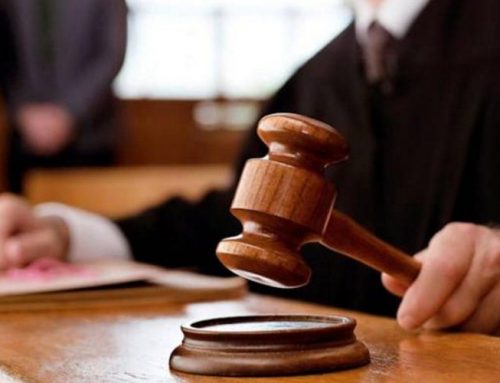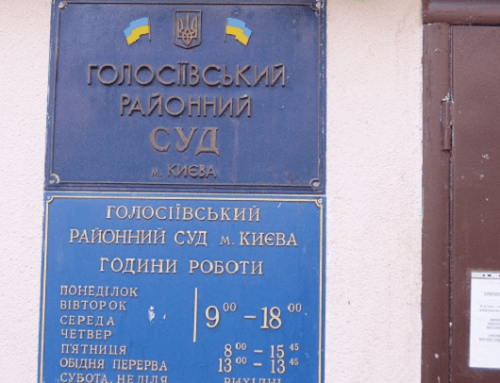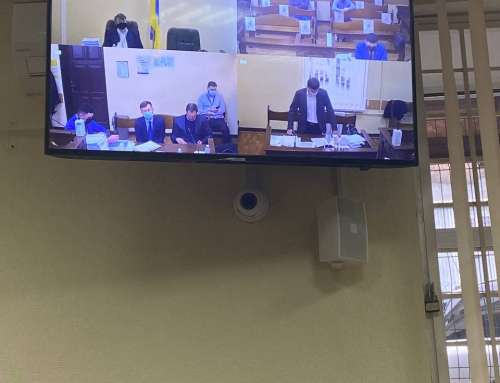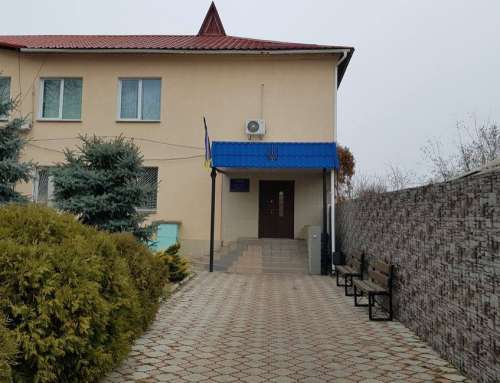Monitoring of criminal proceedings of Manger Vladislav Nikolaevich and Levin Alexey Alekseevich (hearing 11.03.2020)

On 11.03.2020, in the Dniprovsk district court of the city of Kiev, a hearing of case No. 757/31502/20 was held on charges of the chairman of the Kherson regional council Manger V.N. and the ex-assistant of the member of the Kherson regional council Levin A.A. in committing crimes under Part 3 of Article 27; Part 2 of Article 28; Part 2 of Article 121 of the Criminal Code of Ukraine, namely, in organizing the commission of intentional grievous bodily harm by a group of persons by prior conspiracy in a manner that has the character of special torment, which entailed the death of the victim, a Kherson activist Gandzyuk E.
It should be noted that, starting in 2018, five criminal proceedings were opened in this case concerning the murder of the activist. In particular, on October 30, 2019, the Prosecutor General’s Office transferred to the Security Service of Ukraine (SBU) the criminal proceedings on the negligence of the police officers, who initially investigated this case.
Recall that the observer of the International Society for Human Rights has already monitored this case – on 08.28.2020 and 10.15.2020.
The course of the court session: the court continued to examine the materials of the proceedings. In particular, at the last court session on October 15, 2020, the court granted the motion of the lawyer Ilchenko D. for access to documents, namely, to the medical history and medical card of Gandzyuk E. But, as it turned out, the medical history of Gandzyuk E. was never returned to the hospital after a forensic medical examination, a letter was sent by the hospital administration regarding this situation. In the opinion of the defense, the prosecution must find these documents, since it was the prosecution that did not return the documents to the hospital, thereby failing to comply with the court’s decision.
It should also be noted that during the trial, the defendants were sited next to their defenders, and not in the glass box.
The European Court of Human Rights has found that, while the placement of defendants behind glass partitions or in glass booths does not in itself imply an element of humiliation sufficient to achieve a minimum level of severity, this level can be achieved if the circumstances of detention (in a “cage”), taken as a whole, will cause suffering or hardship that exceeds the inevitable level of suffering inherent in detention (“Yaroslav Belousov v. Russia”, para. 125).
It is worth paying attention to the positive trend of finding the accused during court hearings next to a lawyer, and not in a glass box. This is also confirmed by the report of the ISHR in the case of Tuman I. dated July 23, 2020.
Thus, in our opinion, the judges successfully implement the above aspect of the application of Art. 3 of the European Convention and recognize that the presence of an accused in a glass box in some cases may have signs of a violation of the right to defense and degrading treatment.
Examining the decision of the First Deputy Prosecutor General Storozhuk D. dated 11.02.2018 on the transfer of this case to the SBU, the defense side objected to the relevance and reasoning of the decision, emphasizing that the only reason for transferring the case from one pre-trial investigation authority to another is the ineffectiveness of such authority. The prosecutor indicated completely different grounds for the transfer of the case, therefore, according to the defense, from the moment the case was transferred to the SBU authorities, it can be considered that the investigation is being carried out by an inappropriate pre-trial investigation authority. It also follows that all the evidence collected in this case after November 2, 2018 is inadmissible.
With regard to the inadmissibility of evidence, the ECtHR has indicated that it is not the Court’s task to determine, in principle, whether certain types of evidence, for example, evidence obtained illegally from the point of view of national law, can be admissible or, indeed, whether the applicant was guilty or not. The question to be answered is whether the proceedings were generally fair, including how the evidence was obtained. This implies a determination of the “illegality” in question and, if it is a violation of another Convention right, the nature of the violation found (“PG and JH v. The United Kingdom”, para. 76; “Heglas v. Czech Republic”, paras. 89-92).
In addition, the defense referred to clause 6 of Section II of the Order of the General Prosecutor’s Office of Ukraine dated March 28, 2019 No. 51 “On Approval of the Procedure for Organizing the Activities of Prosecutors and Investigators of the Prosecutor’s Office in Criminal Proceedings”, which specifies the criteria for ordering the pre-trial investigation to another body of pre-trial investigation, in particular, the removal of the investigator from the pre-trial investigation and the appointment of another investigator (Article 39 of the Criminal Procedure Code of Ukraine). In the event of an ineffective pre-trial investigation (Article 36 of the Criminal Procedure Code of Ukraine), the assignment of a pre-trial investigation to another pre-trial investigation body is carried out in accordance with the requirements of the law, taking into account the following criteria:
- the fulfillment of the tasks of criminal proceedings has not been ensured;
- the general principles of criminal proceedings have been violated, which has negatively affected or may affect the validity, comprehensiveness and completeness in criminal proceedings;
- the low quality of the procedural activities of the investigator (investigation team), as a result of which the obtained results of such activities do not correspond to reasonably permissible results that should have been and objectively could have been achieved during this time, given the complexity and specifics of the criminal investigation.
The representatives of the victims objected to the statement by the defense. They indicated that the court had case materials confirming the ineffectiveness of the police work at that time in this case.
In addition, other documents were examined: regarding the separation into a new criminal proceeding, the implementation of the investigation in this proceeding as a whole, as well as the reality / unreality of threats coming to witnesses and victims from the accused, according to their own statements.
The next court hearing is to take place on November 20, 2020. Observers of the International Society for Human Rights will continue to monitor the criminal proceeding.








Leave A Comment